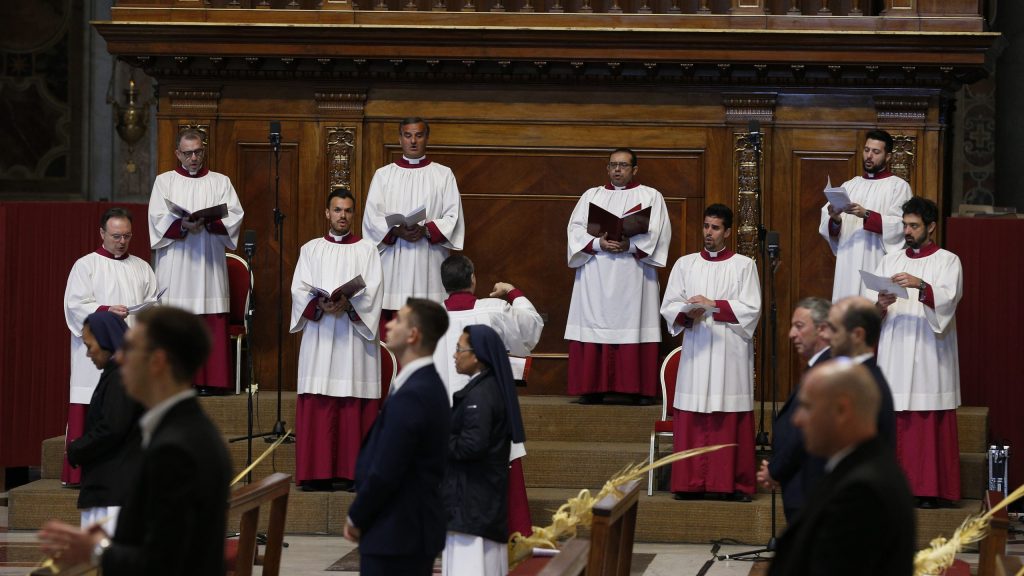From priests donning face masks and gloves while distributing Communion to exchanging nods with socially distant parishioners during the sign of peace, the coronavirus pandemic has changed how Catholics celebrate the liturgy.
But on the register of what is most noticeable, singing tops the list.
In St. Peter's Basilica, where the Sistine Chapel Choir once accompanied papal liturgies and a separate choir led congregational singing, the pandemic practice is to have an organist, a cantor and a few choir members -- all standing a safe distance from one another.
In a phone interview with Catholic News Service June 23, Msgr. Vincenzo De Gregorio, president of the Pontifical Academy for Sacred Music, said that while social distancing measures for church choirs "are obviously indispensable, the liturgy may seem to 'suffer.'"
What is important, he said, is that there is some music.
"Thank God, the situation is also very flexible from the point of view of the regulations so we can celebrate solemnly, even simply, with an organist playing and a cantor singing," he said.
After 52 members of a church choir were infected with COVID-19 during a practice in Washington state in March, the Centers for Disease Control and Prevention warned that singing, especially when people are close to each other, heightens the risk of transmitting the coronavirus.
But sacred music has a fundamental role in Catholic spiritual life. "Through this form, prayer is expressed in a more attractive way" and "minds are more easily raised to heavenly things by the beauty of the sacred rite," said the Vatican's 1967 instruction on music in the liturgy.
"Catholic worship is rooted in a community of believers who come together to express their faith through ritual word and song," Dan Schutte, composer and member of the St. Louis Jesuits, told CNS June 24.
"Yet in most parts of the world, we can't gather in community yet to worship safely. We've been uprooted from the very sacramentality -- music being one of those 'sacraments' -- through which we experience the presence of God in our midst," he said.
Not only does sacred music play an important role in the life of prayer for the faithful, but also for religious communities and congregations, especially the Benedictines.
Abbot Gregory Polan, abbot primate of the worldwide Benedictine Confederation, told CNS June 18 that although the Benedictine community of St. Anselm in Rome has continued to sing during their liturgies and daily prayers, social distancing measures have prevented them from welcoming guests to join them.
"We have really felt the absence of people being able to come to pray with us regularly because even though we are not a parish church, we have a good size group of oblates and friends on the Aventine (Hill) who regularly come to worship with us. So, from that point of view, it's difficult," he said.
However, he also admitted that the new measures have been "kind of a blessing" that have not only led to an increase in prayer but also inspired "creative aspects of enlivening the prayer within the community."
Abbot Polan told CNS that during Lent the Benedictine community not only added a one-hour period of adoration every Thursday, but also found a new way to pray the Stations of the Cross.
"We're blessed with four very fine organists, and also a monk who plays the oboe and another who plays the flute and so we did the stations by means of a musical rendering which was really very inspiring. And the only words that were really spoken were a prayer to accompany the music," he said.
Schutte told CNS that while lockdown measures have prevented him from traveling across the United States to lead parish missions, retreats, evenings of music and workshops, it has led him, like many others, to seek ways "to minister virtually."
"It's forcing me, as it has many of us, to become more adept with the technology that allows us to do things a few months ago we might never have imagined," he said. "Music has not lost its power to capture our minds and hearts, to express our hunger for God. It's just that now we have to explore new ways to deliver that music."
Msgr. De Gregorio told CNS that not only have the pandemic regulations affected how choirs and the faithful sing, but they have also greatly impacted the way sacred music is taught and studied.
While video-chat platforms have made it possible to continue classes, "conducting lessons from a distance and exams from a distance" is a whole new territory for the pontifical academy, he said.
"Our way of teaching has been completely transformed," Msgr. De Gregorio said. "Obviously, as you can imagine, it's one thing to listen to the tone, the timbre of a voice, a piano or an organ live and another thing to listen from a distance."
For Abbot Polan, singing remains a fundamental aspect of sacred music that he hopes will return once COVID-19 vaccines are available.
"I'd like to think that when we get the vaccine and people will be able to be closer to one another and we will pick up singing again, that it will pick up with a renewed spirit of joy to be able to lift our voices in communion with one another for the liturgy," he told CNS.

